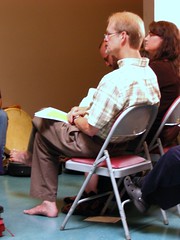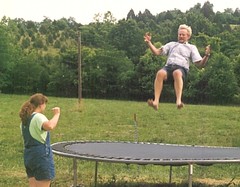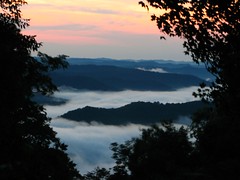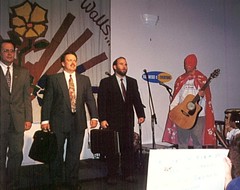Signals of Oddity: Sabbath Economics
I'm going to post an excerpt from the sermon by our dear friend, Rick, who preached the last two weeks at Jeff St on the topic of the Sabbath. (That's Rick in the photo, barefoot and ready to preach!) The Bible passages he refers to are the story of Joseph the dreamer - found in Genesis 47 - and the story of the provision of manna to the people of Israel - found in Exodus 16.
This is just a very brief excerpt from a larger and wonderfully challenging sermon...
...In one of the great ironies of literature, Joseph is praised for resisting the designs of his boss’s wife, while his role as the inadvertent catalyst for the eventual enslavement of his own people is ignored.
Of course, Joseph probably couldn’t have known what his program [gathering together huge amounts of grain, centralized in Egypt - dt] would lead to. But future generations in Israel reflected on their long nightmare in Egypt and filled their literature with warnings about concentrated economic power.
Of course, the Hebrews finally escaped from Egypt. The Exodus from enslavement was the great liberating event of their history. And in the lore that developed about their deliverance, Hebrew storytellers emphasized some intriguing imagery that signified a different way. Manna in the wilderness.
The tale of the manna is much more than a miracle story. It envisions an economic alternative! It’s the symbolic charter for what we call “Sabbath economics.”
*Work in the place where you are.
*Take just enough for your family’s needs.
*Depend on the abundant provision of creation.
*Hoarding and excess result in rottenness.
The dream of Joseph envisions more and more.
The vision of the manna says enough is enough.
The dream of Joseph is take all you can.
The vision of the manna is share what you have.
Accumulate or cooperate.
One dream uproots - and turns into a nightmare for others.
The other dream plants - and prioritizes the needs of others.
The symbol of the manna is the visionary charter of an unseen conspiracy, the seed of change, quietly operating just below the surface.
The manna imagery even takes root in Israel’s national covenant as they develop the Sabbath economics consistent with their faith a God who liberated them from empire.
*Their gleaning laws allowed the poor to gather food off the land. (Deut. 24: 19-22)
*They outlawed interest rates that might lead people into spirals of debt servitude. (Ex. 22: 25)
*They set aside Sabbatical years to protect the land and to free the poor from debt. (Ex. 23: 10-11).
*Even the Sabbath has a humanitarian function (Ex. 23: 12).
*They envisioned periodic years of Jubilee to challenge accumulation of wealth, by redistributing land to level out patterns of concentrated ownership (Lev. 25: 10, 13, 28).
Some Jews even rejected monarchy itself, because it grafted political authority onto economic power. It was too much like Egypt’s system of an all-controlling center, enriched by an impoverished periphery...
So what do these ancient stories mean for us?
Of course, the same competing visions grow in the soil of our history as well. In our society, wealth has been redistributed upward for 30 years, toward greater concentration at the top, and increasing dependence at the bottom. Our nation has the largest gap between rich and poor in its history. The top 1% of Americans now possess 40% of the nation's total wealth.
We’ve been through the worst economic crisis since the Depression — an era also characterized by excess and scandal on Wall Street. Our largest banks are under investigation for complex financial maneuvers that profited from misleading their investors.
We’re now accustomed to terms like hedge funds, derivatives, debt swaps, and mortgage-backed securities — which symbolize the flagrant unchecked greed of an unfettered oligarchy, speculatively gambling with the nation’s wealth for the enrichment of a few, profiting even from the nation’s housing meltdown.
The other side of this coin is millions of homes in foreclosure…
Today, the reintegration of commercial and investment banking has yielded mega-banks so gigantic that their collapse threatens the entire financial system. And most of us are carrying their credit cards — our money, our homes, our welfare all tied up with their power.
We can scarcely imagine an alternative.
Now considered “too big to fail,” the mega-banks appropriate even more of the nation’s wealth unto themselves, gobbling up tax-funded bailouts while awarding themselves multimillion-dollar bonuses. And the recent financial regulation bill may not change as much as we’d hope.
So we’re faced with the age-old choice:
The dream of Joseph or the vision of the manna.
More and more, or enough is enough.
Take all you can, or share what you have.
Accumulate or cooperate.
The danger is more than economic. Justice Louis Brandeis was right when he said: "We can have democracy in this country, or we can have great wealth concentrated in the hands of a few, but we can't have both.”
With millions spent on lobbyists, the mega-banks aren’t just “too big to fail,” but too well-connected to fail.
It’s a dream come true.
The trouble is, while modern-day Josephs dream of profit piled upon profit, we can’t seem to do without a system we now depend on.
For three months, we’ve watched as the BP oil spill has exceeded 100 million gallons, leaving 11 workers dead, unparalleled damage to an ocean ecosystem, fragile wetlands polluted, pelicans and sea turtles coated with petroleum, fish suffocating in underwater plumes of oil.
It’s the terrible price of a crude addiction we cannot shake...
The official history of our era is the story of the powerful — bank bailouts, financial flows, military campaigns, election returns… But do not be deceived. There’s another story.
There’s something going on underground.
It’s the quiet revolution of mustard seeds. The conspiracy of the seemingly insignificant...
It’s the story of countless unnamed midwives to a history flowing forward in a simple basket of reeds.
It’s the story of Shiphrah and Puah, Moses and Amos, St Francis and Dorothy Day, Gandhi and Wilberforce, Sandino and Mandela, Cesar Chavez and Rosa Parks.
What’s happened at Vacation Bible School this week (the kids collecting money and things for the needy) doesn’t seem like much. The gardens we’ve planted in our back yards seem so small. The Tuesday Farmer’s market you’ve worked so hard on is tiny.
But in a concentrated agro-industrial system, these mustard seed realities are nothing less than a new vision germinating in the midst of the old.
Yes, three corporations control the world’s grain trade.
Yes, Monsanto controls three-fifths of the world’s seed production.
But the dream that envisions a local, sustainable food economy can reconnect more and more of us with the source of our food and the rhythms of the earth. This is the odd vision of Sabbath economics, the peculiar practice of the manna alternative.
======
Thanks, Rick!






